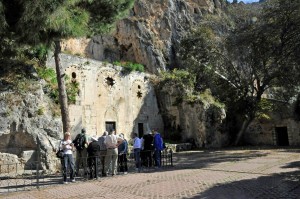A small cave above the city of Antakya in southern Turkey may well be the oldest church in the world, dating to the earliest days of Christianity. It was also probably in or near this cave that early Christians argued over a matter that proved crucial to the ultimate success of Christianity.
In the first century, Antakya, then known as Antioch, was the third largest city in the world and one of the most important cities of the Roman Empire. According to the Bible, Paul and Barnabas spent a year in Antioch recruiting new followers of Jesus, where those followers were first called “Christians.” Exactly where in Antioch these early Christians may have met is impossible to determine, but a natural cave on the side of Mount Stariushas long been thought to be that place.
Not everything in the cave goes back to the time of Paul and Barnabas. Interior mosaics and frescoes date to the fourth or fifth centuries and the Crusaders added a stone exterior after they captured the city in 1098. But a watery hole in the cave floor long used for baptisms may go back to the first century, as may a narrow passage to the outside that early Christians could have used to escape the Romans.
While in Antioch, Paul taught that circumcision was not necessary for Gentiles who wanted to follow Jesus. James, the brother of Jesus and the leader of the church in Jerusalem, disagreed and sent a delegation to Antioch to try to convince Paul that he was wrong. Paul called the emissaries from James the “circumcision group” and the debate got pretty nasty. Writing to the Galatians, Paul said: “As for those agitators, I wish they would go the whole way and emasculate themselves!”Paul eventually won the argument. With the requirement of circumcision no longer an impediment to gaining non-Jewish followers, Paul set off from Antioch on the missionary journeys that eventually spread Christianity to the far reaches of the Roman Empire.
Roman Catholics have identified Peter as the first bishop of Antioch, which became an important city in the early church. So the church in Antioch, although founded by Paul and Barnabas, is now named for Peter and his statue, added in 1932, is now above the altar in the center of the cave.
Many sites traditionally associated with early events in Christian history are suspect at best. But the cave in Antakya has sufficient indicia of authenticity that it may legitimately be considered the place where Paul broke Christianity away from its Jewish moorings to become a religion of the Gentiles.
